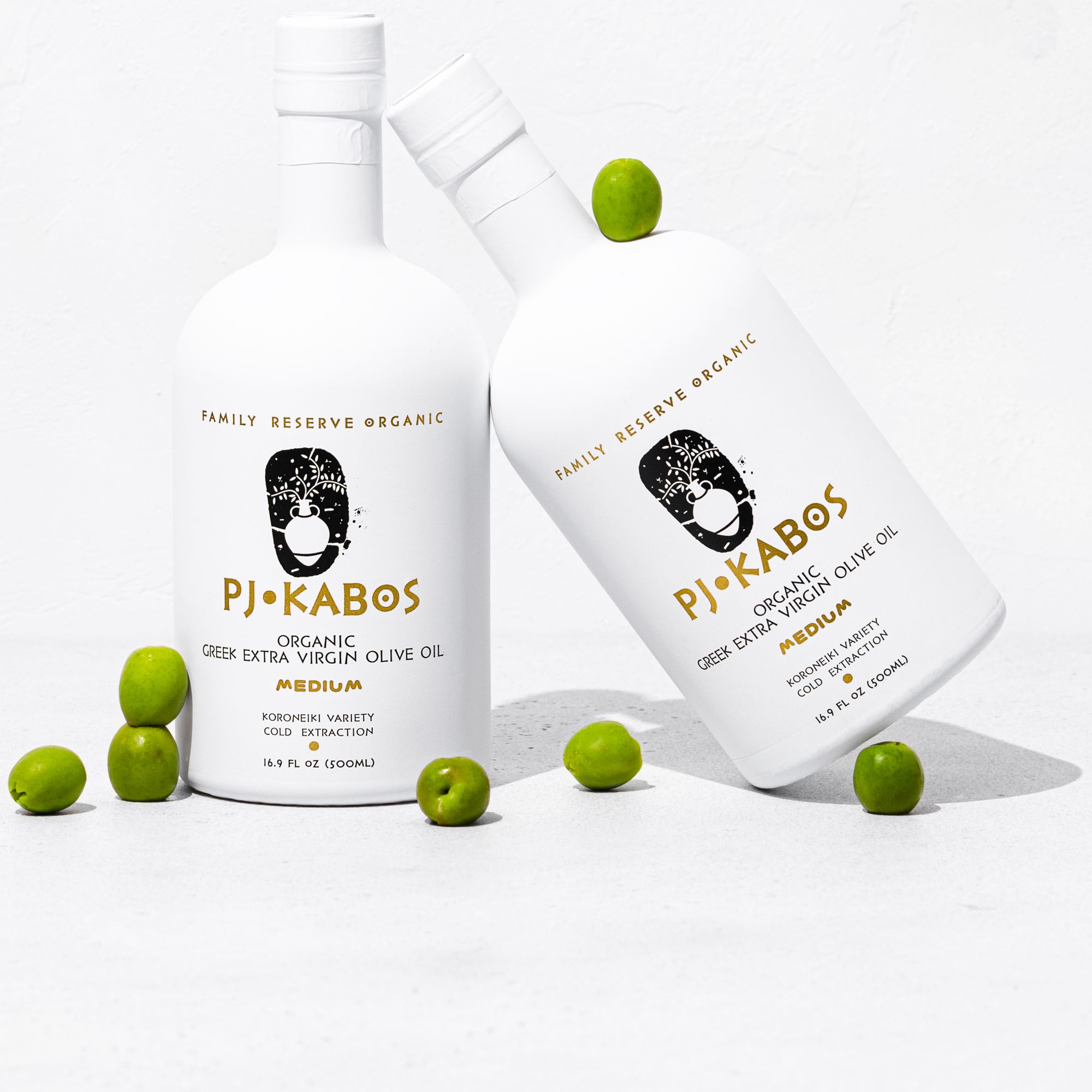People love olive oil—and for good reason. Olive oil (especially extra virgin olive oil) is one of the healthiest, tastiest, and most versatile cooking oils you can buy.
Olive oil spans a range of delicious flavors, depending on the types of olives used and when they were harvested—from robust, vegetal, and peppery to smooth, buttery, and subtly fruity. And while it shines when used in raw applications (e.g. in dressings and as a finishing oil), it’s also fantastic for most cooking.
Additionally, olive oil has been associated with many health benefits, such as reducing risk of heart disease and inflammation, lowering cholesterol, supporting bone and gut health, curbing risk of diabetes, and boosting the appearance of skin and hair. Olive oil is particularly beneficial for heart health when it’s used to replace sources of saturated fat (like butter) in the diet
Olive oil’s health benefits come from a combo of healthy monounsaturated fats (MUFAs), polyphenol compounds (e.g. oleuropein, hydroxytyrosol, and oleocanthal), and other micronutrients such as vitamin E. Both MUFAs and polyphenols have anti-inflammatory properties, and polyphenols have additional antioxidant and antimicrobial perks, too. Olive oil’s high levels of MUFAs and polyphenols are also why it holds up so well to high-heat cooking.
Together, these compounds help contribute to olive oil’s major health perks and aromatic properties. But how do other common cooking oils compare? Below, we compare olive oil’s nutrition facts to the nutrition facts of avocado oil, canola oil, coconut oil, and sunflower oil.
Olive Oil Nutrition Data
Olive oil is high in monounsaturated fats and a range of micronutrients such as polyphenols, vitamins E and K, squalene, chlorophyll, and carotenoids. Many of these micronutrients don’t get listed on the official nutrition facts label, but they are most abundant in EVOO and present in smaller amounts in other types of olive oil.
One tablespoon of extra virgin olive oil contains the following, according to the USDA:
- Calories: 119
- Total fat: 13.5 g
- Saturated fat: 1.9 g
- Polyunsaturated fat: 1.4 g
- Monounsaturated fat: 10 g
- Cholesterol: 0 mg
- Total carbohydrate: 0 g
- Protein: 0 g
How Do Other Oils Compare?
At a quick glance, the nutritional values of other culinary oils appear quite similar to olive oil. And in many ways, they are—the number of calories (about 120) and the grams of total fat (about 14 grams) per serving are almost identical. However, the percentage of specific types of fat (monounsaturated fat, polyunsaturated fat, saturated fat) they contain can vary significantly.
Additionally, most other oils are more highly processed and don’t contain close to the amount of polyphenol compounds or other micronutrients present in olive oil. But you won’t see this noted on the nutrition facts label.
Avocado Oil Nutrition Facts
Because avocados are composed of mostly monounsaturated fats, the nutritional breakdown of avocado oil and olive oil is quite similar. Both are low in potentially harmful saturated fats and high in anti-inflammatory, heart-healthy MUFAs.
Virgin avocado oil also contains a variety of healthy plant compounds, including polyphenols, vitamin E, phytosterols, squalene, chlorophyll, and carotenoids such as lutein—however, it doesn’t appear to be quite as potent in many of these compounds as extra virgin olive oil.
One tablespoon of avocado oil contains the following, according to the USDA:
- Calories: 124
- Total fat: 14 g
- Saturated fat: 1.6 g
- Polyunsaturated fat: 1.9 g
- Monounsaturated fat: 10 g
- Cholesterol: 0 mg
- Total carbohydrate: 0 g
- Protein: 0 g
Canola Oil Nutrition Facts
Canola oil is composed predominantly of monounsaturated fats and contains vitamin E, like olive oil. However, it contains slightly higher levels of polyunsaturated fats. In general, canola oil is also significantly more processed than olive oil, which results in nearly nonexistent levels of polyphenols and many other micronutrients. Studies show that it doesn’t hold up as well to high-heat cooking as olive oil either, likely due in part to its increased content of polyunsaturated fats, which are less heat-stable.
One tablespoon of canola oil contains the following, according to the USDA:
- Calories: 124
- Total fat: 14 g
- Saturated fat: 1.03 g
- Polyunsaturated fat: 3.94 g
- Monounsaturated fat: 8.86 g
- Cholesterol: 0 mg
- Total carbohydrate: 0 g
- Protein: 0 g
Coconut Oil Nutrition Facts
Unlike olive oil, coconut oil is composed predominantly of 80-90% saturated fat, with small amounts of polyunsaturated fats and monounsaturated fat. This high saturated fat content makes coconut oil more resistant to spoilage than olive oil, but it’s also the reason some nutrition experts are wary of coconut oil’s impact on health—particularly cardiovascular health. Unrefined coconut oil also contains small quantities of phytosterols and antioxidants.
One tablespoon of coconut oil contains the following, according to the USDA:
- Calories: 117
- Total fat: 14 g
- Saturated fat: 12 g
- Polyunsaturated fat: 0.25 g
- Monounsaturated fat: 1 g
- Cholesterol: 0 g
- Total carbohydrate: 0 g
- Protein: 0 g
Sunflower Oil Nutrition Facts
Sunflower oil is quite similar to canola oil in its nutritional makeup. It is composed predominantly of monounsaturated fats and contains vitamin E, but it contains slightly higher levels of polyunsaturated fats than olive oil. Sunflower oil is also a highly processed oil, which results in nearly nonexistent levels of polyphenols and many other micronutrients. Studies show that it doesn’t hold up as well to high-heat cooking as olive oil either, likely due in part to its increased content of polyunsaturated fats, which are less heat-stable.
One tablespoon of mid-oleic sunflower oil, which is the most common sunflower oil on the market, contains the following, according to the USDA:
- Calories: 124
- Total fat: 14 g
- Saturated fat: 1.22 g
- Polyunsaturated fat: 3.94 g
- Monounsaturated fat: 7.8 g
- Cholesterol: 0 mg
- Total carbohydrate: 0 g
- Protein: 0 g
The Verdict
There’s no denying that olive oil (particularly extra virgin olive oil) has a superior composition of fats, polyphenols, micronutrient compounds, and research-backed health benefits compared to other cooking oils—making it the best all-around oil for drizzling, dipping, cooking, and more. Some other cooking oils may also deserve a place in your pantry (for example: avocado oil and coconut oil may offer some unique flavor and nutrient benefits of their own), but if we’re ranking based on cumulative perks, then EVOO wins every time.
Product placement
PJ KABOS 'Family Reserve Organic - Medium'
High Phenolic and 2022 Gold-Award Winner.
Declared as 'One of the World's Best Olive Oils'.
Click here to shop.





